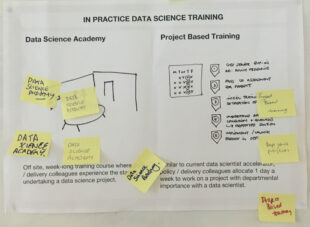Ed Parkes, at Gov.UK: “Back in April we set out our plan for the discovery phase for what we are now calling “data science literacy”. We explained that we were going to undertake user research with civil servants to understand how they use data. The discovery phase has helped clarify the focus of this work, and we have now begun to develop options for a data science literacy service for government.
Discovery has helped us understand what we really mean when we say ‘data literacy’. For one person it can be a basic understanding of statistics, but to someone else it might mean knowledge of new data science approaches. But on the basis of our exploration, we have started to use the term “data science literacy” to mean the ability to understand how new data science techniques and approaches can be applied in real world contexts in the civil service, and to distinguish it from a broader definition of ‘data literacy’….
In the spirit of openness and transparency we are making this long list of ideas available here:
Data science driven apps
One way in which civil servants could come to understand the opportunities of data science would be to experience products and services which are driven by data science in their everyday roles. This could be something like having a recommendation engine for actions provided to them on the basis of information already held on the customer.
Sharing knowledge across government
A key user need from our user research was to understand how others had undertaken data science projects in government. This could be supported by something like a series of videos / podcasts created by civil servants, setting out case studies and approaches to data science in government. Alternatively, we could have a regularly organised speaker series where data science projects across government are presented alongside outside speakers.
Support for using data science in departments
Users in departments need to understand and experience data science projects in government so that they can undertake their own. Potentially this could be achieved through policy, analytical and data science colleagues working in multidisciplinary teams. Colleagues could also be supported by tools of differing levels of complexity ranging from a simple infographic showing at a high level the types of data available in a department to an online tool which diagnoses which approach people should take for a data science project on the basis of their aims and the data available to them.
In practice training
Users could learn more about how to use data science in their jobs by attending more formal training courses. These could take the form of something like an off-site, week-long training course where they experience the stages of undertaking a data science project (similar to the DWP Digital Academy). An alternative model could be to allocate one day a week to work on a project with departmental importance with a data scientist (similar to theData Science Accelerator Programme for analysts).

Cross-government support for collaboration
For those users who have responsibility for leading on data science transformation in their departments there is also a need to collaborate with others in similar roles. This could be achieved through interventions such as a day-long unconference to discuss anything related to data science, and using online tools such as Google Groups, Slack, Yammer, Trello etc. We also tested the idea of a collaborative online resource where data science leads and others can contribute content and learning materials / approaches.
This is by no means an exhaustive list of potential ways to encourage data science thinking by policy and delivery colleagues across government. We hope this list is of interest to others in the field and we will update in the next six months about the transition of this project to Alpha….(More)”